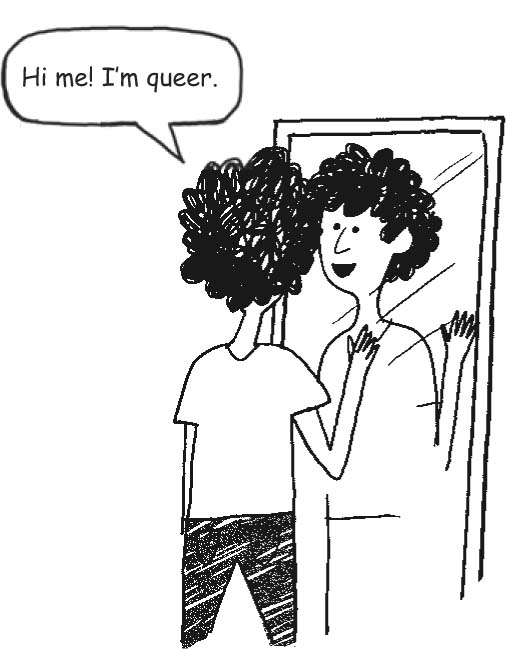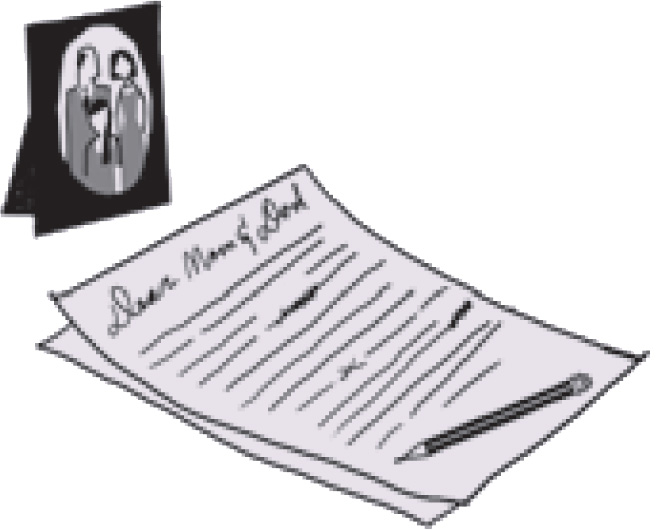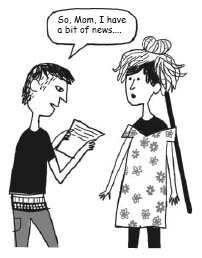Queer (4 page)
Authors: Kathy Belge


How Kathy Came Out to Her Parents

I was 19 and I was traveling cross-country (by foot!) to join a group of people working on peace and justice issues. I was a young and proud lesbian, and everyone around me knew I was gayâbut not my family back home. The more time I spent being out in my new environment, the worse I felt about the fact that I wasn't out to my parents. So one day I decided to sit down and write them a letter. In it, I tried to explain that I was a lesbian and probably always had been. I said that I saw myself making a life with another woman and that I was happy the way I was and hoped they would be, too. I put a stamp on it and sent it off.
There was no way for my parents to call me, but I was able to receive mail at various post offices along my route. My dad's letter came first. In it he said he was fearful that I would have a hard life but he loved me no matter what and only wanted me to be happy. My mom's letter, which followed, said the Kathy she knew "was dead" and that she was going to need some time to adjust to the news. I remember sitting in my tent and bawling my eyes out.
Once I finally got up the courage to call home, my Mom was able to explain what she meant: that she had to let go of all her old preconceptions about me and start to look at me as a new person. I was relieved but still wished I had told my parents in person so we could have had a real discussion about it. Now that it's many years later, both of my parents are totally fine with my being queer and they are glad that part of my job is to help other people come out and feel OK about it.
A lot of parents get freaked out when they find out that one of their children is LGBTâeven if they're the most loving and supportive parents in the world. Many older folks immediately think about the "sex" part of homosexuality or bisexuality, though you may not be thinking about that at all. For instance, you might just be trying to talk to a crush without chewing all of your nails off, but your parents are already envisioning what you'll be doing in bed together.
To be fair, most parents are uncomfortable with any thoughts that involve their kids and sex, even if the kids are straight. Parents worry about things like disease, heartbreak, and pregnancyâit's their job. But if they know that their kid is queer, they'll find new things to be concerned about, like what the neighbors will think, if it means they won't have grandchildren, or if all their ambitious plans for you will suddenly fall apart.
We know these fears are complete nonsense. No one knows what the future will bring. And who cares what the neighbors think about your personal life? But a lot of adults were taught when they were younger that being queer is always a negative thing. You'll need to educate yourself and channel some confidence to be able to calm their fears and speak your truth. It may take a lot of effort for you to convince them that you're totally fine with who you are and that your life is not over. (Au contraireâit's just beginning!) And who knows? Maybe your parents will give you a giant bear hug and thank you for being honest. Or maybe they've known all along, didn't think it was a big deal, and were just waiting for you to admit it. In that case, your coming out will actually relieve them.
Some queer teens prefer to tell a close brother or sister first (and sometimes your brothers and sisters figure it out for you, even before you know yourself). Other queer teens approach an aunt, uncle, or cousin with whom they share a special bond. Telling someone you trust in your family before you tell your parents can be good practice. It will help give you the courage to come out to your folks and build a safety net in case your parents react badly.
You may feel ready to jump right in and tell your folks that you're LGBT. But before you let the games begin, ask yourself, "Is this the right time?" If you're not totally sure if you're queer and are still in the questioning stage, then sometimes it's best to wait until you're certain before you make any declarations. There's no use stirring up a potential hornet's nest until necessary, and it'll be easier to reassure your parents if you yourself feel confident. Of course, if you have the kind of relationship with your parents where you can talk openly about things and you think they'd be able to help you process your feelings without judgment, then you can share what's going on for you. You know your parents best, so do what works for you. And if you feel they really have to know
right now,
be prepared for their responses.
You've decided you're going to do it: You're going to tell your folks that you're as queer as a three-dollar bill with a picture of Liberace on it. Think about these three factors as you're planning your course of action.
 Timing is everything.
Timing is everything.
Pick a time that you know you can talk to them uninterrupted. It's best not to do this around a family holiday, but if one of your parents lives far away and that's the only time you see them, then work with what you have. Some people like to sit their parents down and make an announcement. For others, it feels more comfortable to talk while you're doing something else, like making dinner or folding laundry. If your parents are separated, you may need to do this twice, so start with the one you think will take it better and use his or her reaction to gauge how and when to approach the other parent.
And don't bring along your boyfriend or girlfriend. You want to make sure your parents understand that this is about who you are, not about the person you happen to be dating at the moment. Plan it out.
Plan it out.
Some people just blurt out the news with little finesse, but that's not necessarily the best idea because it can seem confrontational. Instead, give some thought to what you are going to say and how you are going to say it. Need some help? Start by telling your parents that you have something important you want to tell them. Assure them you've done a lot of thinking and reflecting about it, and that you've realized that you're lesbian, gay, bi, or trans. Tell them you feel good about coming out to them because you know they appreciate honesty and that you hope the family can support you. If you are really nervous about it, you could try writing down what you want to say in advance and practice the scene with a friend. See if he or she can ask you some difficult questions, and practice answering them.
If you are really nervous about it, you could try writing down what you want to say in advance and practice the scene with a friend. See if he or she can ask you some difficult questions, and practice answering them.
1997
YEP. I'M GAY
In 1997, Ellen DeGeneres, a popular TV star, changed the landscape of queer representation on TV and the perception of queer actors in the public eye. At the time, DeGeneres had her own show called
Ellen
(a sitcom in which she played the main character), and in an historic episode, she had her character, Ellen Morgan, come out as a lesbian on the show. While there had already been TV shows with gay or lesbian characters, the characters often felt stereotyped, and the parts were small. Now there was a protagonist on prime time TV talking openly about being a lesbian, which was really exciting for queer viewers. At the same time, DeGeneres herself also decided to come out to the public. She announced to the world that she was a lesbian on the cover of
Time
magazine. (The famous headline was "Yep. I'm Gay.") She received backlash from conservatives for both of these moves, but in the end, her coming out inspired other queer celebrities and their fans to become more open about their sexuality. DeGeneres also broke new ground in the way queerness was treated on mainstream shows. Years later, shows like
Will and Grace, Brothers and Sisters, Glee,
and
Greek
would feature queer protagonists and draw huge audiences.
 Be patient
Be patient
. Give your parents time to react. Be prepared to answer any questions they have. You can arm yourself with some literature from the helpful organization Parents, Families, and Friends of Lesbians and Gays (PFLAG, pflag.org), if you think that will help. If your parents are religious, you might want to line up a gay-friendly priest, rabbi, imam, or other religious leader to talk to them, or offer some literature that addresses homosexuality and religion. (See our Resources section.) Try to let them know that nothing has changed about you, that they just know something new about you that they didn't before. Offer to talk more about it later if they need time to take it all in. Hopefully you'll start a continuing dialogue and things will grow positively from there.